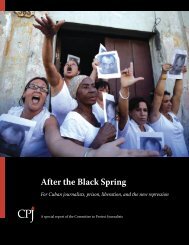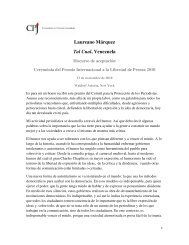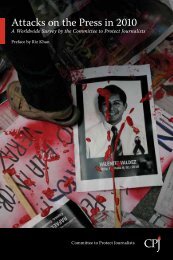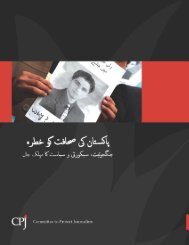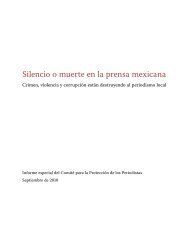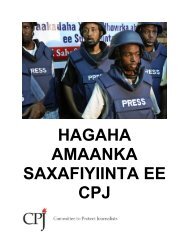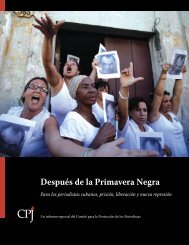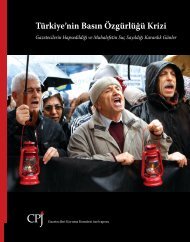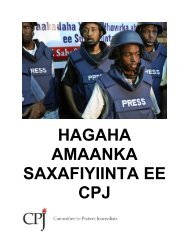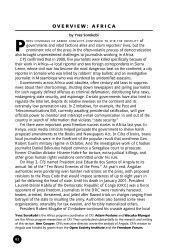Attacks on the Press - Committee to Protect Journalists
Attacks on the Press - Committee to Protect Journalists
Attacks on the Press - Committee to Protect Journalists
- No tags were found...
Create successful ePaper yourself
Turn your PDF publications into a flip-book with our unique Google optimized e-Paper software.
Gen. David Petraeus, commander of U.S. Central Command, reportedin September a 60 percent increase in violence in Afghanistan over <strong>the</strong> prior year,although he <strong>to</strong>ld <strong>the</strong> Infantry Warfighting C<strong>on</strong>ference that it was “a heck of alot less than <strong>the</strong> height of violence in Iraq.” <str<strong>on</strong>g>Attacks</str<strong>on</strong>g> in <strong>the</strong> capital, Kabul, wererare before 2008, but since that time a dozen major assaults were reported in <strong>the</strong>city, including attacks by a range of militant groups <strong>on</strong> <strong>the</strong> German Embassy, <strong>the</strong>headquarters for <strong>the</strong> NATO-led force, <strong>the</strong> Informati<strong>on</strong> Ministry and <strong>the</strong> JusticeMinistry buildings, as well as o<strong>the</strong>r targets near <strong>the</strong> U.S. Embassy, presidentialpalace, and airport.In late year, more than 71,000 NATO troops making up <strong>the</strong> Internati<strong>on</strong>alSecurity Assistance Force (ISAF) were going up against a wide array of militantgroups including hard-line Taliban and Al-Qaeda fighters, criminal gangs, anddrug traffickers, all operating in a country without a str<strong>on</strong>g central government—in many ways a scenario reminiscent of Iraq.Robert Reid, a veteran Associated <strong>Press</strong> journalist who has served as bureauchief in Kabul and Baghdad, <strong>to</strong>ld CPJ in Oc<strong>to</strong>ber that “we d<strong>on</strong>’t hear <strong>the</strong> hourlyexplosi<strong>on</strong>s or <strong>the</strong> heavy nighttime bursts of gunfire that were fixtures of life in Baghattacks<strong>on</strong> <strong>the</strong> press in 2009asia: analysisJuly, <strong>the</strong>y complained of persistent harassment from <strong>the</strong> military <strong>on</strong>ce <strong>the</strong> regulararmy launched operati<strong>on</strong>s within <strong>the</strong> North West Fr<strong>on</strong>tier Province.<strong>Journalists</strong> in foreign news bureaus said <strong>the</strong>y were taking more precauti<strong>on</strong>s.“We are certainly more security c<strong>on</strong>scious than ever,” said Carol Grisanti, leadA U.S. producer says she relies<strong>on</strong> her local crew <strong>to</strong> ‘go ital<strong>on</strong>e’ in certain areas.producer in Islamabad for <strong>the</strong>U.S. televisi<strong>on</strong> network NBC.“New York has <strong>to</strong> sign off <strong>on</strong>any trips outside of Islamabadand weigh <strong>the</strong> safety risks beforegoing <strong>to</strong> cover <strong>the</strong> s<strong>to</strong>ry.” As of late year, Grisanti said, NBC had not seen <strong>the</strong>need <strong>to</strong> hire a private security firm as many organizati<strong>on</strong>s did in Iraq.“We definitely rely more <strong>on</strong> our local crew <strong>to</strong> go it al<strong>on</strong>e inside <strong>the</strong> NorthWest Fr<strong>on</strong>tier Province,” said Grisanti, who said she and o<strong>the</strong>r NBC staffers had<strong>on</strong>ce accompanied local reporters <strong>on</strong> such trips. With NBC’s foreign desk in NewYork worried about <strong>the</strong> local staff ’s safety, she said, “I need <strong>to</strong> run all trips by <strong>the</strong>mfor safety c<strong>on</strong>cerns and <strong>the</strong>n get <strong>the</strong>ir approval.”Those c<strong>on</strong>cerns were underscored in December when a suicide bomber se<strong>to</strong>ff an explosive device as he tried <strong>to</strong> enter <strong>the</strong> grounds of <strong>the</strong> Peshawar <strong>Press</strong>Club. Four people were killed—including a police c<strong>on</strong>stable who had s<strong>to</strong>pped <strong>the</strong>bomber at <strong>the</strong> gate—while 26 were injured. About 30 journalists were inside <strong>the</strong>club for a press c<strong>on</strong>ference.dad for years. Nor do we have <strong>to</strong> c<strong>on</strong>tend with <strong>the</strong> hard divisi<strong>on</strong>s in <strong>the</strong> city thatwe used <strong>to</strong> face in Beirut in <strong>the</strong> 1980s.” The capital was getting <strong>to</strong>ugher, he said, but“Westerners can still move about in most of Kabul as l<strong>on</strong>g as <strong>the</strong>y maintain a situati<strong>on</strong>alawareness and avoid certain areas of <strong>the</strong> city, especially at night.”Coverage decisi<strong>on</strong>s outside <strong>the</strong> capital, however, were riskier. “There are wideareas of <strong>the</strong> country that are no-go areas. I wouldn’t send a Westerner by car <strong>to</strong>Kandahar, like we were able <strong>to</strong> do in 2002, nor <strong>to</strong> Kunduz, Kunar, Paktia, andPaktika. We d<strong>on</strong>’t make any trips outside of Kabul without checking first with <strong>the</strong>Afghan police, <strong>the</strong> U.N., ISAF, and some of <strong>the</strong> security companies. All of thatdoes require greater use of Afghan journalists than a few years ago,” Reid said.In interviews withjournalists stati<strong>on</strong>ed ino<strong>the</strong>r foreign news bureausin Kabul, it was clear thatall had taken heightenedAbducti<strong>on</strong>s in Afghanistantarget Western journalists butendanger local reporters, <strong>to</strong>o.security precauti<strong>on</strong>s, though not <strong>to</strong> <strong>the</strong> same extent as was d<strong>on</strong>e in Iraq. OneU.S. journalist, who did not want <strong>to</strong> be named because <strong>the</strong> pers<strong>on</strong> did not want<strong>to</strong> appear critical of an employer, said Kabul would not resemble Baghdad in partbecause news budgets were tight. “Of course we’re more security c<strong>on</strong>scious, wehave <strong>to</strong> be,” <strong>the</strong> journalist said. “But we’re also under pressure <strong>to</strong> keep costs down.If things get worse, I d<strong>on</strong>’t know what <strong>the</strong> plan will be: More security, or less coverage?Maybe both?”Internati<strong>on</strong>al journalists reflect an unusually high proporti<strong>on</strong> of media fatalitiesin Afghanistan, according <strong>to</strong> CPJ research. Eleven of <strong>the</strong> 17 journalistskilled in Afghanistan between 2001 and 2009 were foreign reporters andpho<strong>to</strong>graphers. That’s far above <strong>the</strong> worldwide proporti<strong>on</strong>: CPJ data show thatabout 15 percent of journalists killed in any given country are internati<strong>on</strong>al reporters.Casualties from militants’ increasing use of roadside bombs underlined<strong>the</strong> risk. The death of <strong>the</strong> Canadian journalist Lang in late December followedseveral o<strong>the</strong>r cases in which roadside bombs injured media workers. CBS reporterCami McCormick was wounded while embedded with U.S. troops inAugust; a similar strike, also in August, injured Associated <strong>Press</strong> cameramanEmilio Morenatti and pho<strong>to</strong>grapher Andi Jatmiko.A string of abducti<strong>on</strong>s also seemed <strong>to</strong> highlight <strong>the</strong> risk <strong>to</strong> Western reporters.The captives included La Repubblica’s Daniele Mastrogiacomo in 2007; <strong>the</strong> CBC’sMellissa Fung, Dutch writer Joanie de Rijke, British journalist Sean Langan, andNew York Times reporter David Rohde in 2008; and <strong>the</strong> Times’ Farrell and twounidentified French TV journalists in 2009. All but <strong>the</strong> French reporters escapedor gained <strong>the</strong>ir release, but observers also saw in <strong>the</strong>se cases <strong>the</strong> grave risks <strong>to</strong> localreporters: Mastrogiacomo’s fixer, local reporter Ajmal Naqshbandi, and driver,110111




